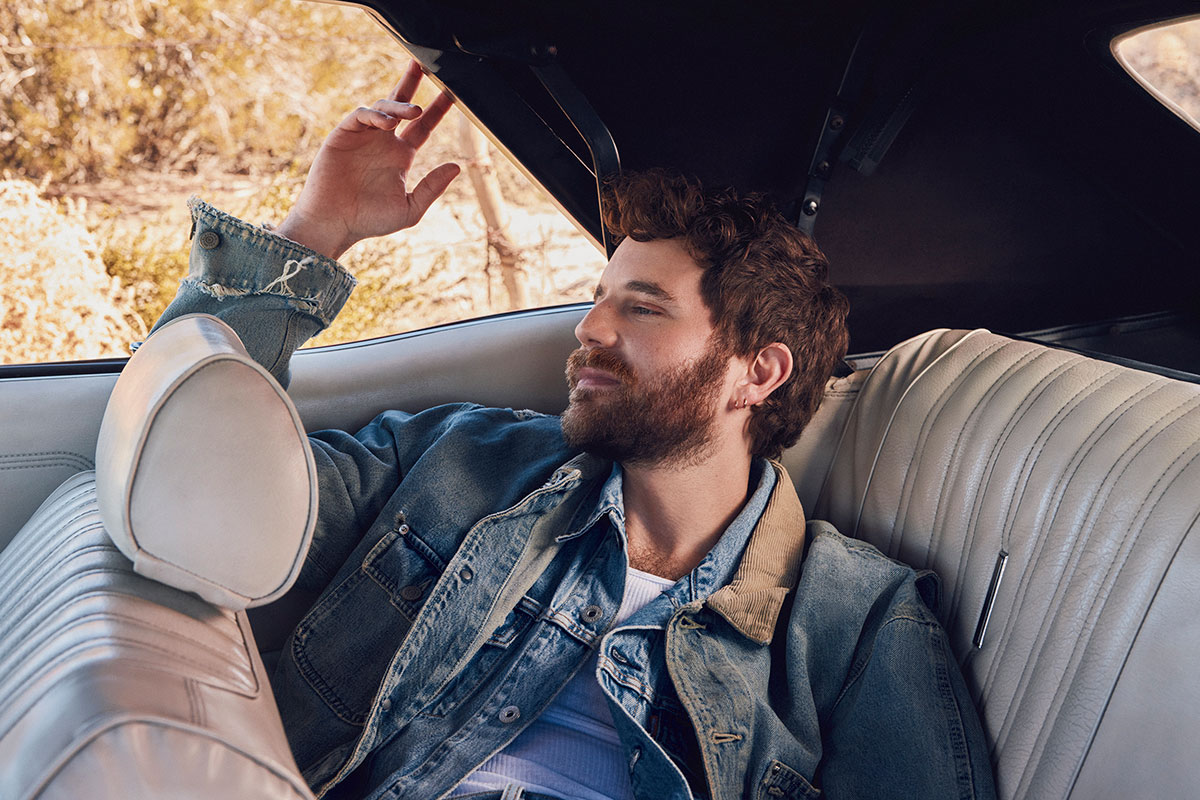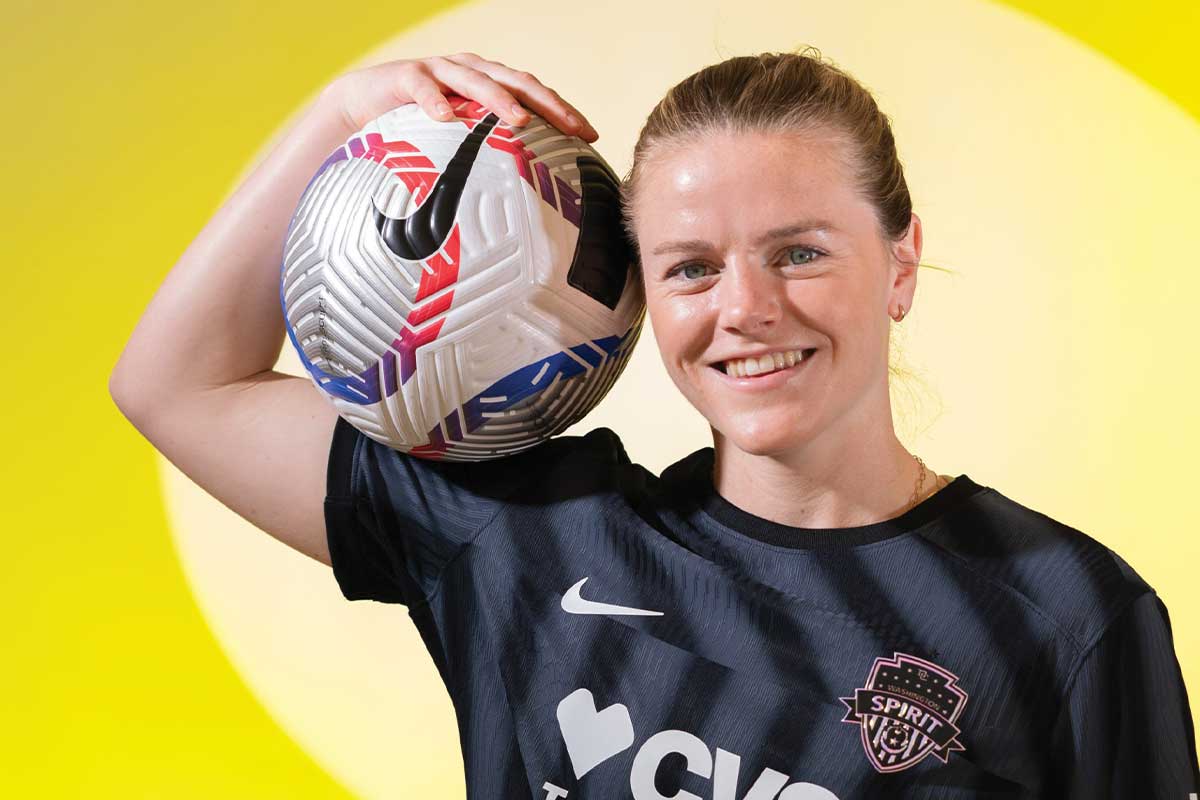“I always dreamt of being a cowgirl,” owner Karen Way says with a smile as she walks the stunning, expansive property at Ovoka Farm in Paris, a small village community located in Fauquier County. It is just before sunset at the 690-acre farm, which dates back to the 1730s and is home to nearly 400 beef cattle, and work is winding down for the evening.
“I even almost attended cowgirl college in Arizona,” she continues, before explaining that her path was cut short due to an injury. Instead, Way became a lawyer, practicing in the Chicago area for several years before moving to Virginia with her family for a slower pace of life.
Way’s husband had spent many summers on the other side of the mountain in Wildcat Hollow and grew up visiting Ovoka Farm and its guard peacocks. When the property came up for sale, the stars seemed to align. Way saw it as an opportunity to finally make her cowgirl dream a reality: She and her family purchased the property in 2010.
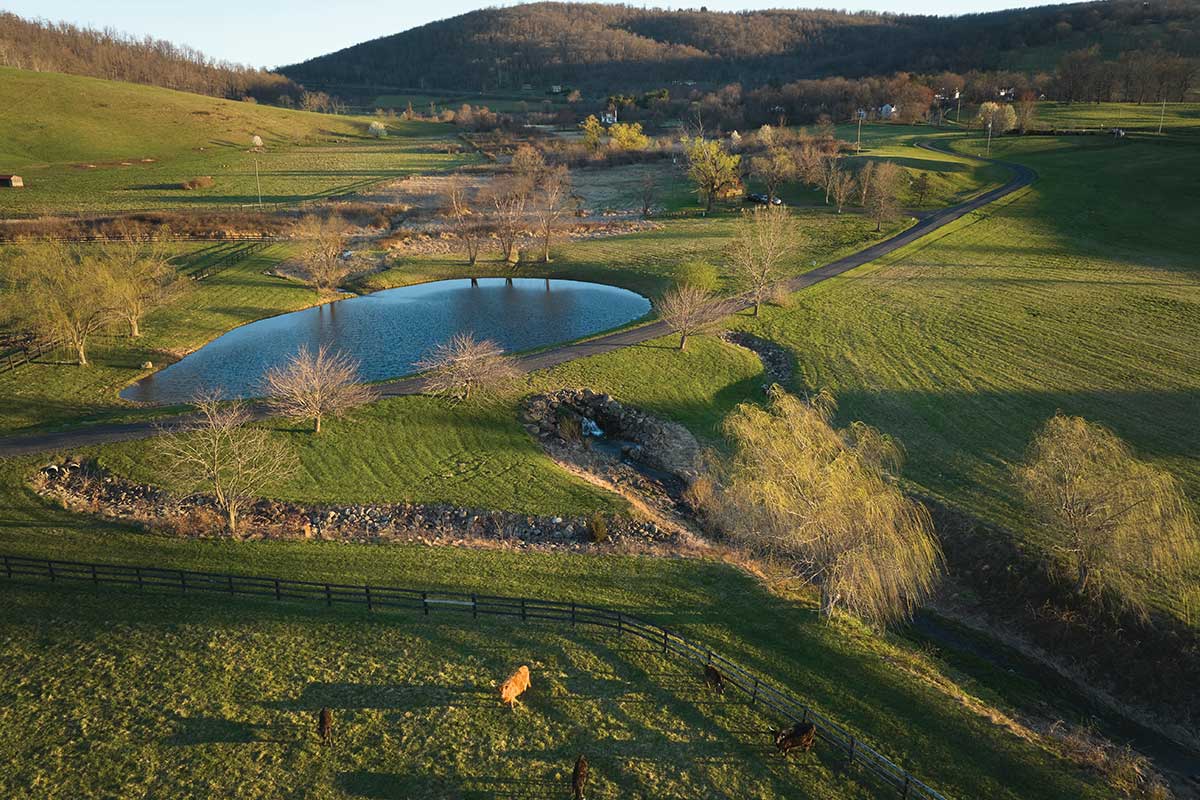
A Wagyu Trailblazer
Way’s family fell in love with the taste of wagyu beef several years back, after trying it for the first time at a Texas restaurant. Wagyu is a breed of cattle originating in Japan that is known for the tenderness and marbling of its beef. “It is the most tender breed that you can buy,” Way explains, adding that it is a cousin of Kobe beef.
Way says the family started researching different bloodlines and imported embryos from Japan to try its hand at raising wagyu beef cattle at Ovoka Farm. The family inseminated its first host cows in 2010, and the adventure began.
They never looked back: Over the past couple of years, Ovoka Farm’s pioneering approach to wagyu has piqued the interest of many chefs and restaurants in the DMV area, from burger joints to Michelin-starred establishments. Its meat is now featured on over 30 menus, including at The Inn at Little Washington, Magnolias at the Mill, and Field & Main in Virginia; and in DC, at The Dabney and Bourbon Steak at the Four Seasons.
“It’s interesting to be one of the forerunners in this industry, especially on the small-farm side,” says Way. “We are truly unique just in the fact that we decided to start raising these guys.”
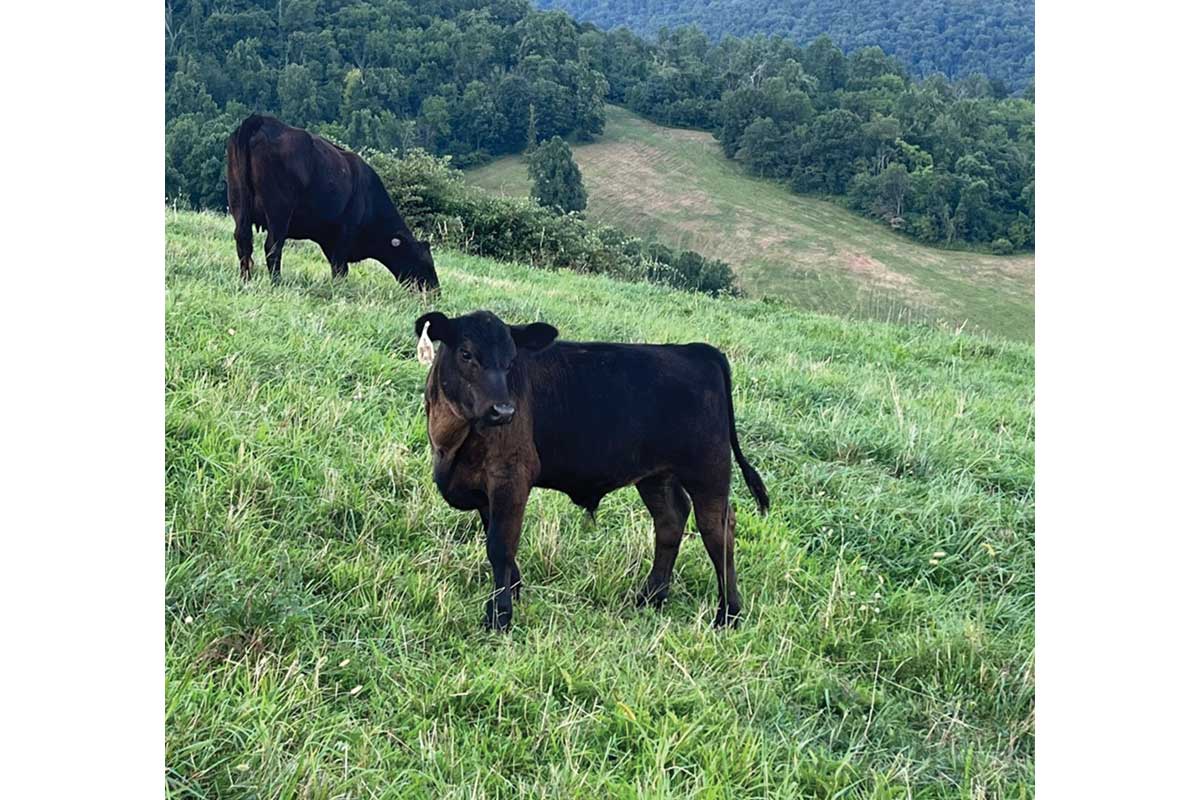
The farm is now home to mostly F1 wagyu — which is half wagyu, half Angus — and full-blood wagyu cattle. Way says the farm chooses to raise F1 wagyu because it achieves the best marbling, while also keeping the bold flavor profile of Angus.
While wagyu beef was introduced to the U.S. in 1976, the idea of raising the cattle is still relatively new here.
“We quickly learned that wagyu are not the same as any other breed typically found around here,” says Way. “They take a very special way of raising, and you have to interact with them very closely.”
Way says through the process of growing their herd, they discovered a need for educating people on how to find true wagyu.
“Beyond educating people about the delicious taste of wagyu, we also had to reeducate in the face of false advertisers using the term ‘American’ or ‘domestic wagyu,’” Way says. “This is not a regulated term and could be as little as 5 percent wagyu. That’s exactly why we are transparent with our naming F1, or 50-50 wagyu-Angus.”
Girl Bossing
In September 2020, Way decided to really put those cowgirl boots on for the first time and assumed full management and operations of the farm.
“When I took over, I changed everything about the management, creating a whole new business plan from the ground up,” Way says. “I had a decent handle on how to raise cows, but I had no idea how to sell steaks.”
Enter Jessica Morton.
Way brought on Morton, who has a background in retail management for big box stores like Target and Lidl, as chief operating officer to help with sales.
“Neither of us were entrepreneurs, but Jessica helped turn this into a real business,” says Way. “We figured out if you are able to cut steaks out of the whole animal, then you can achieve price points for everyone.”
“The day I started is the day we started cold-calling,” says Morton. “I just came in, put my head down, started analyzing, and haven’t looked back. It took a lot of planning and a lot of meetings, but after two-and-a-half years, it has taken off.”
Way and Morton had been friends before teaming up, but running Ovoka has brought them closer together. They have some funny stories to tell, too.
“We had been hiking up and down the mountain throughout a winter storm looking for any renegade unexpected newborn calves all day and into the night,” Way recalls. “At about 3 a.m., after the last trip down the mountain, we collapsed in the living room and were shocked and impressed that we had survived such an incredibly hard day both physically and mentally.
“We started joking around about it, and suddenly one of us was like, ‘We’re badass.’ And then, the other one was like, ‘We’re badass bitches … We’re badass bitches of beef.’ It just kept going,” she says. “And then, it just kind of stuck. We now call it ‘BABBz’ for short.”
They even display the nickname on the license plates of the Ovoka trucks.
Bigger and Better
After seeing success as a two-woman operations team, Way and Morton were ready to add a third member to tackle more of the farm management. “It had just been the two of us up to this point, so it was a little scary inviting someone into your world,” says Morton. “We just knew they had to be genuine and have that same passion.”
Their search led them to Roy Lambert, a Virginia native with nearly 30 years of farm and agricultural management experience.
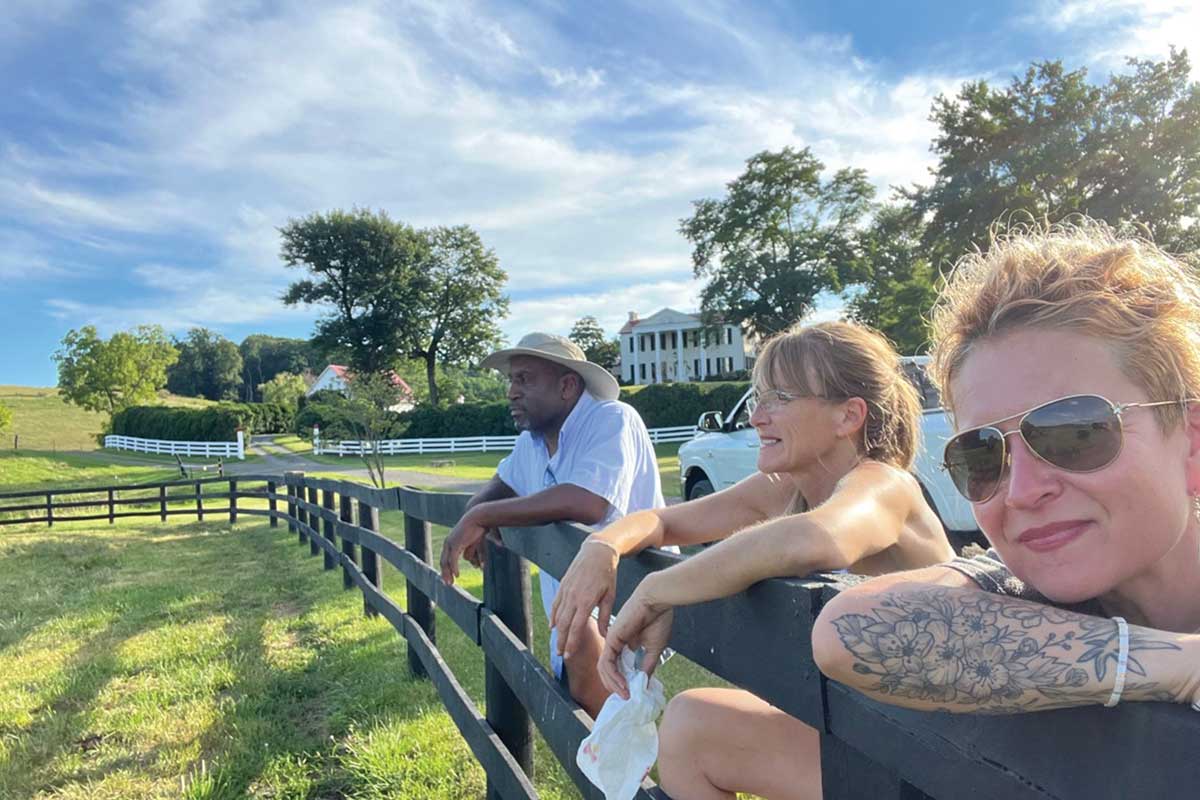
“I’ve been here full time since September of 2022, and I can honestly say I haven’t ‘worked’ a day since I started,” Lambert says, praising the farm’s positive and family-oriented environment.
“He truly was the missing link to our business,” says Way, explaining how Lambert embraces traditional farming practices, while also keeping up with newer, more efficient techniques.
Lambert implemented the rotational grazing program at Ovoka, which has been monumental for the farm. “With wagyu cattle, you have to have consistency every month, every week, every day,” says Lambert. “We have that additional challenge of having to be precise. Other farms, if they were short, they could just get other animals. We can’t do that. It takes around two years to grow wagyu beef cattle.”
The farm’s family atmosphere extends to younger generations as well. “We all have children that are involved, too,” says Way.
Calling All Chefs
It’s no wonder that Ovoka Farm has drawn interest from serious restaurants in the area.
“We often invite local restaurants to come out and see the farm in action,” says Way, “to see that we truly are what we say we are, and what you’re buying is real.”
“We’re not the middleman,” adds Morton. “We are the farmers.”
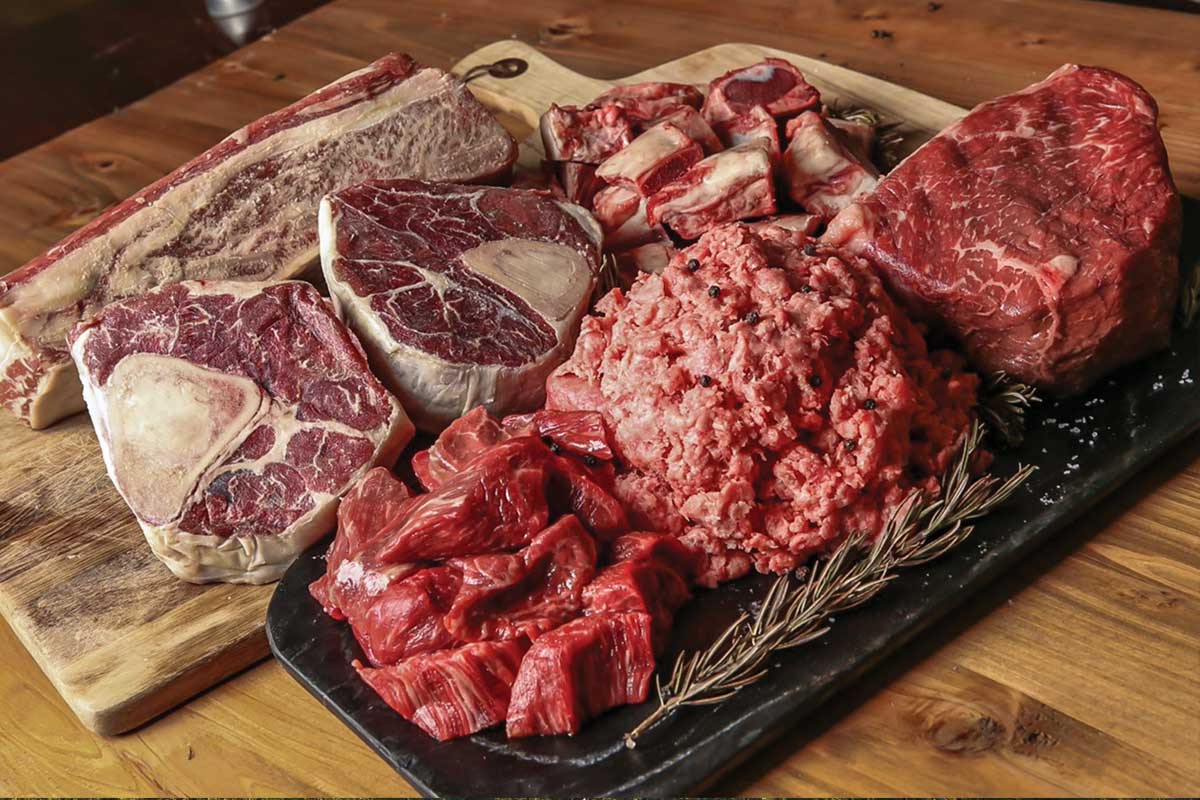
Red House Tavern in Haymarket has been sourcing meat from Ovoka since opening in March 2022.
“Our steak dish is structured as ‘Ovoka Farm’s Wagyu Cut,’ so we work with Ovoka to use the whole cow, essentially,” says chef Joel Valente. “We use anything from skirt to hanger to strip to my favorite: coulotte.”
The restaurant also uses Ovoka’s burger grind, which Valente notes makes for one of the best burgers he has ever had.
The customers seem to agree.
“People love the beef they care after at Ovoka,” Valente says. “We get incredible amounts of compliments here at the Tavern.
“Ovoka is just an incredible farm,” Valente adds. “I have been there on two or three occasions, and they really practice what they preach.”
The Market Salamander at the Salamander Resort & Spa in Middleburg also sources meat from Ovoka. It partners with the farm for special events such as the Local Wagyu Wine Dinner.
“Wherever I work, I always go with the local cattle and local produce in that area or region,” chef Pete Smith says. “What [is] so special about Ovoka Farm is that you don’t really find local wagyu much on the East Coast. And also, their meat is just so flavorful. It’s ridiculous how flavorful the meat is.”
The Market Salamander features Ovoka’s ground beef on its lunch menu, as well as tenderloin, strip loin, rib-eyes, flank steaks, and flat irons for its events. Smith says he uses the tenderloin for his beef carpaccio appetizer. “For this, I trim the beef and then we flash-freeze it before thinly slicing it on the plate. Then, it is seasoned with a good olive oil, salt and pepper, Parmesan cheese, fresh herbs, red onion, and shaved black truffles.
“It’s been great working with Ovoka Farm,” adds Smith. “They’re reliable, the product is always good and fresh, the price is consistent, and you know what you’re getting. And, overall, they’re just good people at heart, which means a lot to me. I like working with good people.”
A Nod to the Past
Located in one of the four designated International Dark Sky Parks in Virginia, Ovoka Farm is a stargazer’s dream. When you stand at the highest point overlooking the farm, you glimpse a view that belongs on a postcard. Despite the fact that the farm is nearly an hour from DC, on a clear day you can make out the Washington Monument from this peak.
But it’s not just its beauty that draws people to Ovoka Farm. There’s a lot of history as well. The farm’s name loosely translates to “ever-running water,” Way says, adding that she has been conducting research in the National Archives in hopes of adding more historical tours to the property’s repertoire.
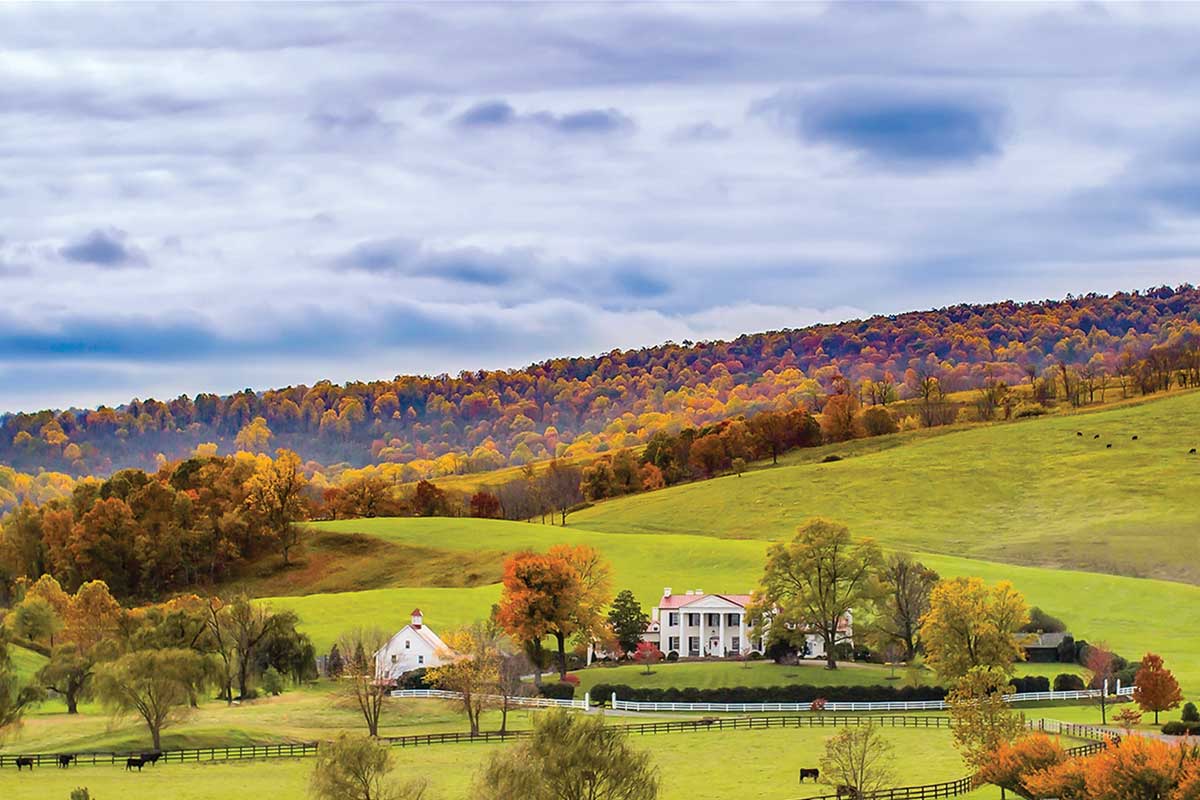
“What I’ve discovered is that both sides of the Civil War went traipsing back and forth all through here,” Way says. “I also learned that George Washington came through this land. He references the stone cabin on the property in one of his journals in the Archives.”
Way keeps a copy of the passage in the cabin for visitors to see when they explore the farm.
In addition to monthly themed tours, such as “Calving and Cabernet,” the farm serves as a venue for celebrations like weddings and family get-togethers — and soon, cooking classes. There’s even a “mini-moo” farm tour and wagyu tasting “for our future wranglers” who are ages 7 and up.
The farm focuses on teaching younger generations to explore agriculture as a viable business pursuit. “Growing up, no one ever told me, ‘You could be a farmer,’” Way says. “[I heard], ‘You could be a lawyer or businessperson,’ but a farmer — never. As it turns out, farming is the most amazing thing I’ve ever done. I wish I had started 30 years ago.”
Feature image by Shannon Ayres
This story originally ran in our July issue. For more stories like this, subscribe to Northern Virginia Magazine.




